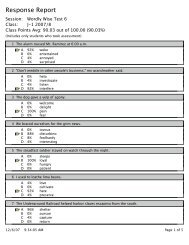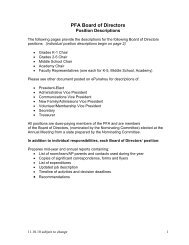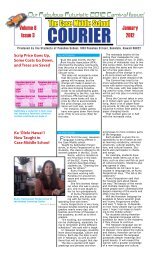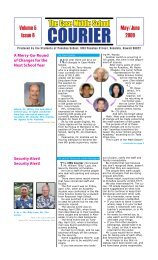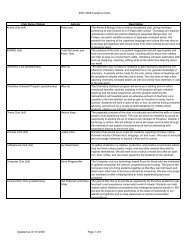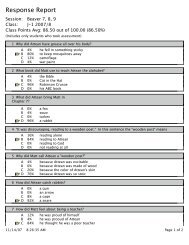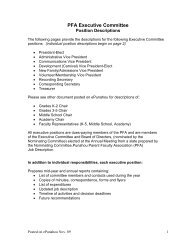You also want an ePaper? Increase the reach of your titles
YUMPU automatically turns print PDFs into web optimized ePapers that Google loves.
<strong>Flexible</strong> <strong>Spending</strong> <strong>Account</strong>Frequently Asked QuestionsQ-1. What is a Flex Plan?Also referred to as a Cafeteria Plan or Section 125 Plan, it is a voluntary plan established by youremployer that allows you to choose from various employee benefits which you will pay for out of yoursalary before payroll taxes are calculated.Q-2. How does a Flex Plan work?Once a year you will have an opportunity to elect if, and to what extent, you will participate in the Plan.You will decide which plan benefits you would like to enroll in and then agree to redirect part of yoursalary through your employer’s Flex Plan to pay for them. By redirecting your salary through the FlexPlan, you avoid paying any payroll taxes on the redirected amount. Your election is irrevocable duringthe Plan Year except in cases of a change in family or employment status.Q-3. What does nontaxable basis mean?The benefits you purchase through your employer’s Flex Plan are completely tax-free. They arededucted from your salary before federal and state income taxes, Social Security, Medicare and statedisability insurance withholdings are calculated.Q-4. How are these benefits reported on my W-2?Benefits paid for through a Flex Plan are never included in the taxable compensation reported on your W-2. Any contributions you make to a Dependent Care Assistance Plan will be reported in Box 10 of yourW-2 but not as taxable income. The purpose for this is to ensure that you report the name and taxpayeridentification number of the dependent care provider you are paying fees to during the plan year on yourpersonal income tax return.Q-5. What advantage is this to me?The biggest advantage is the tax savings. A Flex Plan uses pre-tax dollars to pay for otherwise after-taxexpenses that you will incur even without a Flex Plan. The most common of these expenses is yourshare of your employer’s group insurance benefits. If you must pay an amount each pay period in orderto have insurance coverage through your employer, with a Flex Plan in place, your payments will bededucted from your paycheck before taxes are calculated. This reduces the amount of taxablecompensation and consequently, the taxes you pay.Q-6. If I redirect part of my salary, won’t I make less money?No. With a Flex Plan you are not reducing your salary but redirecting part of it through the Flex Plan topay for IRS qualified expenses. If you compare your take-home pay before participating in the Flex Planto your take-home pay after participating, you will see that your net income actually increases.Q-7. How long am I committed to participate if I enroll in the Flex Plan?Your election is irrevocable for the Plan Year. You will not be able to alter or discontinue yourparticipation until the next Plan Year. The only exception to this rule is if you experience a QualifyingEvent that will allow you to change or drop your election. See Q-9 below for additional information onQualifying Events. See Q-9 below for additional information on Qualifying Events.Q-8. If I don’t sign up now can I sign up at a later date?You will have one chance each plan year to enroll in the Flex Plan (unless you experience a qualifyingchange in status that will allow you to enroll mid-year). If you do not sign up during your initial enrollmentperiod, your next opportunity will be next Plan Year.
Q-9. What is a “Qualifying Event” that will allow me to change my election during the Plan Year?A Qualifying Event is typically a change in family status such as a change in marital status or adding orlosing a dependent. There are other types of events that may also qualify such as a change inemployment status or eligibility for benefits under this or another employer’s benefits program. Thechange you will be allowed to make is dictated by the Qualifying Event you experience. The section ofthe Internal Revenue Code that addresses permitted election changes is extensive. If you are unsureabout whether or not your event will allow you to make a specific change to your election, speak with yourHR department.Q-10. Are there any negative aspects I should know about?Because you are not paying Social Security tax on the portion of your income that has been redirected,your Social Security benefits will be slightly reduced. However, if you place the tax savings into a savingsvehicle, your retirement benefits can be even greater. Also, remember that Flex Plan elections areirrevocable for the plan year. Some benefits (such as a <strong>Flexible</strong> <strong>Spending</strong> <strong>Account</strong>) can have otherdisadvantages (such as forfeitures) if not used properly. Careful planning can minimize the risksassociated with <strong>Flexible</strong> <strong>Spending</strong> <strong>Account</strong>s. Please refer to the Summary Plan Description forinformation about the specific benefits offered under your employer’s plan.Q-11. What benefits can be offered through a Flex Plan?The most common benefits offered through a Flex Plan are Group Insurance Benefits. If you pay for aportion of the premiums to obtain health insurance coverage through your employer’s group policy, youwill be able to pay the premiums on a pre-tax basis. Other benefits may be offered including a HealthFSA and Dependent Care Assistance Plan (both referred to as <strong>Flexible</strong> <strong>Spending</strong> <strong>Account</strong>s). Youremployer’s Summary Plan Description will identify which benefits are offered under your employer’s plan.Q-12. What are <strong>Flexible</strong> <strong>Spending</strong> <strong>Account</strong>s (FSAs)?FSAs are accounts that you fund with pre-tax dollars and use to reimburse yourself for qualified out-ofpocketexpenses. Throughout the plan year you set aside an elected amount withheld from yourpaycheck on a pre-tax basis. As you incur expenses, you submit your claim(s) and receive areimbursement from your FSA. The two most common types of FSAs are the Health FSA (sometimesreferred to as a Medical Expense Reimbursement <strong>Account</strong>) and Dependent Care Assistance Plan. TheHealth FSA allows you to reimburse yourself with tax-free dollars for expenses related to your (and yourqualified dependents’) health care such as co-payments and deductibles. The Dependent CareAssistance Plan works similarly but will reimburse you for qualified dependent care expenses such aschildcare needed while you work.Q-13. My Employer offers <strong>Flexible</strong> <strong>Spending</strong> <strong>Account</strong>s, how are benefits paid?When you have incurred health or dependent care expenses, you complete a claim form for thoseexpenses and submit it, along with receipts or other proof of expenditure. Reimbursements for healthcare expenses are made based on your annual election less any prior reimbursements for the year.Dependent care expenses are reimbursed based on the balance of your account.Q-14. What are “eligible health care expenses” under a Health FSA?Eligible medical expenses are those expenses for medical care identified in Section 213 of the InternalRevenue Code. They must be incurred by you or your qualified dependents during the plan year and notreimbursed from any other source (such as your employer-sponsored group health insurance). Anexpense is considered incurred when you receive the actual treatment, not necessarily when you pay forit. Prepaid expenses are eligible for reimbursement at the time (and during the Plan Year) treatment isprovided. Alternatively, you may receive reimbursement for expenses incurred but prior to paying yourservice provider.Q-15. What expenses are not eligible under a Health FSA?Expenses not incurred out of medical necessity are not eligible. Expenses that are not eligible forreimbursement include, but are not limited to: insurance premiums- (these usually can be a pre-tax basisdirectly from payroll but should not be included in your Health FSA election), COBRA premiums, cosmeticprocedures (such as teeth bleaching, face lift, hair implants), most Over the Counter drugs (OTC)



